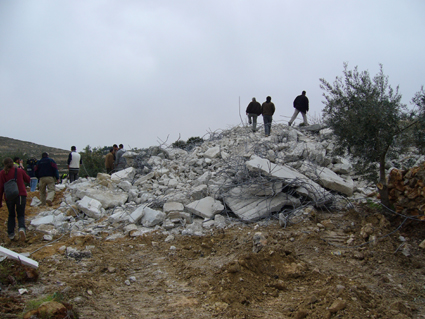Tag: Nablus
-
Palestinian and international civilians to resist revenge home demolitions
16th October 2015 | International Solidarity Movement, Al-Khalil team | Nablus area, occupied Palestine Palestinian civilians joined by International solidarity activists will gather tonight, Friday 16, October 2015, at the Nablus city homes of Yahya Hamad, Karam Al-masri and Sameer Al-kosa after Israeli forces threatened revenge demolitions within 24 hours. Yesterday night, hundreds of Palestinians…
-
Settlers terrorize Palestinian farmers in Burin: burn trees and disrupt olive harvest
14th October 2015 | International Solidarity Movement, Nablus team | Burin, occupied Palestine A Palestinian farmer and English human rights defender have been hospitalized and at least 40 olive trees burnt following an attack by illegal Israeli settlers in the northern West Bank town of Burin today. At 10am this morning, as ISM and other…
-
Israeli army prevents farmers to pick olives in Burin
9th October 2015 | International Solidarity Movement, Nablus Team | Burin, Occupied Palestine This Friday morning, at approximately 10:30 am, a group of 6 soldiers came down the mountain from the illegal Israeli settlement, Arousa, in the village of Burin, to prevent the family of Ahmad Mustafa Najjar from picking their olives. Early in the morning,…



